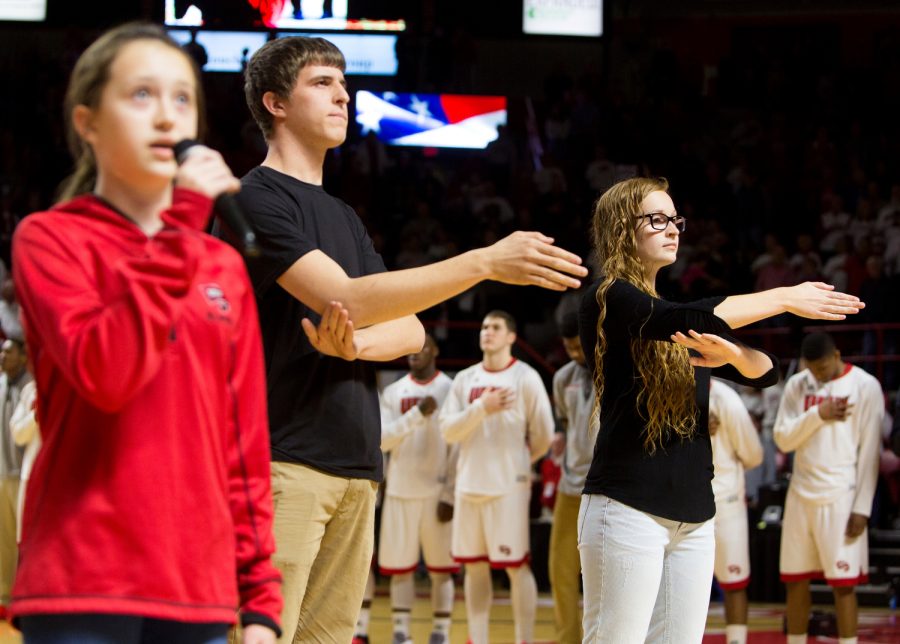Signers from WKU’s ASL program sign national anthem
March 15, 2016
Performing the national anthem at sporting events is a fundamental tradition. This year, for the first time, deaf WKU fans were able to experience that tradition at Diddle Arena.
At each of the final three home games of the men’s and women’s basketball season this year, the student-lead American Sign Language Organization has signed along with the sung national anthem before tipoff.
“We had a great reception from both the athletic department and the fans,” assistant professor Ashley Fox said. Fox coordinates American Sign Language Studies at WKU and helped organized the program’s relationship with the athletic department.
The partnership between ASLO and the athletic department began with obtaining tickets for deaf fans to attend with a translator. Fox said ASLO then offered to sign the national anthem.
Zach McKay, the marketing director for athletics, said the athletic department was very open to the idea of students signing the national anthem.
“We thought it would be a very cool event,” McKay said.
Members of the ASLO hope to continue the practice of signing the anthem for athletic events at WKU. Junior and signer Austin Rutland of Lexington said signing at events like games raises awareness about deaf culture and the ASL program.
The Hilltoppers won a close game after overtime against Louisiana Tech on March 5. Anticipation of a great game paired with senior night lead to a great turnout.
“I got really nervous because the stadium was packed,” said junior Miranda Kittinger, who signed at the last home game this year.
Just as there are a number of ways to sing the national anthem without changing the lyrics, there are many ways to signify its meaning in American Sign Language without changing the message.
“We’re not just signing word for word,” Rutland said. “We have to break down what the lyrics mean, so it’s a little more creative.”
The ASLO is also highly involved in the local deaf community. Students can minor in ASL at WKU, and the credits they earn can be used to fulfill foreign language requirements.
“I thought it was a great experience for our students and fans,” Fox said about the games. “I hope we can have translators at all sporting events and university events.”
Ed. note: A previous version of this story incorrectly identified the students as “interpreters.” This has been corrected to a more accurate “signers.” In addition, the article contained a few references to “being hearing impaired,” instead of the more-acceptable reference of “deaf.” These errors have been corrected in the online version. The Herald regrets these errors.



















![Students cheer for Senator at Large Jaden Marshall after being announced as the Intercultural Student Engagement Center Senator for the 24th Senate on Wednesday, April 17 in the Senate Chamber in DSU. Ive done everything in my power, Ive said it 100 times, to be for the students, Marshall said. So, not only to win, but to hear that reaction for me by the other students is just something that shows people actually care about me [and] really support me.](https://wkuherald.com/wp-content/uploads/2024/04/jadenmarshall-600x422.jpg)



